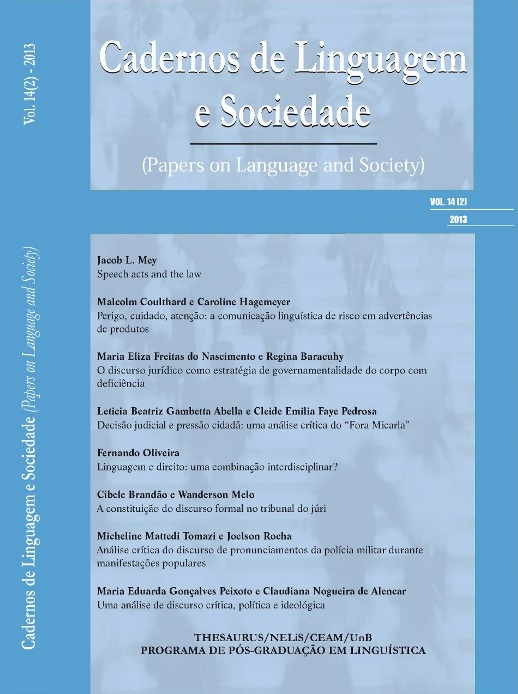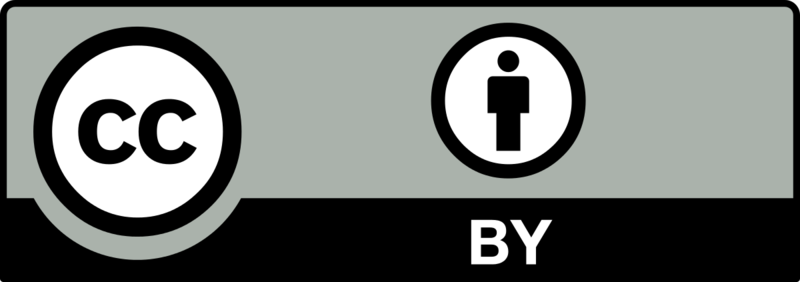Atos de fala e a lei
DOI:
https://doi.org/10.26512/les.v14i2.9197Keywords:
Atos de fala (pragmáticos); Normas legais; Contratos; sequencialidade.Abstract
The present article endeavors to put the old question of the ‘force of words’ into a pragmatic perspective, especially insofar as the law and legal texts are concerned. Questioning the wisdom of the old adage “Saying it don’t make it so”, I show that words do have an effect (which philosophers and linguists have tried to capture, using the concepts of ‘speech act’ or ‘pragmatic act’), and that the legal constituents of this ‘force’ are precisely what makes contractual acts valid. Here, too, words sometimes may be omitted, or substituted by actions, provided the context allows for it. Based on a few historical and contemporary cases, the article demonstrates furthermore how words indeed make a difference in a variety of legal and other societal contexts. The pragmatic (that is, user-oriented) angle is always paramount, and our words should obey the pragmatic conditions, often called ‘affordances’, of the situation in which they are being uttered.
Downloads
References
AZUELOS-ATIAS, Sol. A pragmatic analysis of legal proof of criminal intent. Amsterdam: John Benjamins. (Reviewed by Jacob L. Mey in RASK: International Journal of Language and Communication, 34: 118-123), 2007. Blockmans, Wim. Emperor Charles V 1500-1558. London: Arnold. 2002.
HAUGH, Michael. The constitution of politeness implicature in conversation. Journal of Pragmatics 39: 84-110. 2007.
ISER, Wolfgang. The Act of Reading: A Theory of Aesthetic Response. Baltimore & London: The Johns Hopkins University Press. [Orig. German title: Der Akt des Lesens: Theorie ästhetischer Wirkung.] 1980 [1976].
MEY, Jacob L. When voices clash: A study in literary pragmatics. Berlin: Mouton de Gruyter. 2000.
MEY, Jacob L. Pragmatics: An introduction. Oxford: Blackwell [Second edition]. 2001 [1993].
MEY, Jacob L. Turning the tide of speech. Keynote address at the Third International Symposium ‘Meaning, Context and Cognition’ (MCC 2013), University of Lódz, Poland, 11-13 April 2013.
MORRIS, Charles H. Foundations of the theory of signs. Chicago: University of Chicago Press. (= Rudolf Carnap et al. (eds.), International Encyclopedia of Unified Science, Vol. 2:1). 1938.
OESTERREICHER, Wulf. Dialogue and Violence: The Inca Atahualpa meets
Fray Vicente de Valverde, Cajamarca, Peru, 16th November 1532. In: Andreas H. Jucker, Gerd Fritz and Franz Lebsanft (eds.), Historical Dialogue Analysis, 431- 464. Amsterdam: John Benjamins.1999.
RUNCIMAN, [Sir] Steven. The Sicilian Vespers: A History of the Mediterranean World in the Late 13th Century. Cambridge: Cambridge University Press. (Penguin Pelican edition, 1969, subtitled ‘The rising which brought about the overthrow of the universal papal monarchy’). 1969 [1958].
WEGENER, Philipp. Der Wortsatz. Indogermanische Forschungen 39: 1-26. 1921.
ZAVALA, Silvio A. Las instituciones jurídicas en la conquista de América. México: Porrúa. 2001 [1983].



